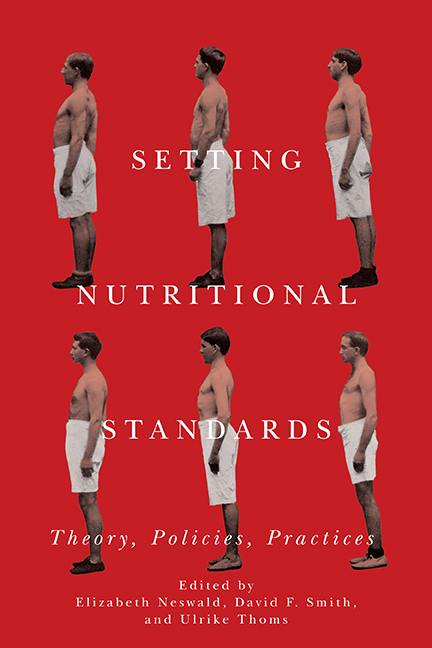Book contents
- Frontmatter
- Contents
- Acknowledgments
- Introduction
- 1 Nutritional Knowledge between the Lab and the Field: The Search for Dietary Norms in the Late Nineteenth and Early Twentieth Centuries
- 2 How Vegetarians, Naturopaths, Scientists, and Physicians Unmade the Protein Standard in Modern Germany
- 3 Of Carnivores and Conquerors: French Nutritional Debates in the Age of Empire, 1890–1914
- 4 Setting Standards: The Soldier's Food in Germany, 1850–1960
- 5 The Quest for a Nutritional El Dorado: Efforts to Demonstrate Dietary Impacts on Resistance to Infectious Disease in the 1920s and 1930s
- 6 “Not a Complete Food for Man”: The Controversy about White versus Wholemeal Bread in Interwar Britain
- 7 “Proscribing Deception”: The Gould Net Weight Amendment and the Origins of Mandatory Nutrition Labeling
- 8 When Is a Famine Not a Famine? Gauging Indian Hunger in Imperial and Cold War Contexts
- Selected Bibliography
- List of Contributors
- Index
Introduction
Published online by Cambridge University Press: 18 April 2018
- Frontmatter
- Contents
- Acknowledgments
- Introduction
- 1 Nutritional Knowledge between the Lab and the Field: The Search for Dietary Norms in the Late Nineteenth and Early Twentieth Centuries
- 2 How Vegetarians, Naturopaths, Scientists, and Physicians Unmade the Protein Standard in Modern Germany
- 3 Of Carnivores and Conquerors: French Nutritional Debates in the Age of Empire, 1890–1914
- 4 Setting Standards: The Soldier's Food in Germany, 1850–1960
- 5 The Quest for a Nutritional El Dorado: Efforts to Demonstrate Dietary Impacts on Resistance to Infectious Disease in the 1920s and 1930s
- 6 “Not a Complete Food for Man”: The Controversy about White versus Wholemeal Bread in Interwar Britain
- 7 “Proscribing Deception”: The Gould Net Weight Amendment and the Origins of Mandatory Nutrition Labeling
- 8 When Is a Famine Not a Famine? Gauging Indian Hunger in Imperial and Cold War Contexts
- Selected Bibliography
- List of Contributors
- Index
Summary
“Nutrition is not a discipline, it is an agenda.” This declaration, made by the French American nutrition scientist Jean Mayer has been adopted as the mission statement of the Friedman School of Nutrition Science and Policy at Tufts University in Massachusetts. As the title of the school indicates, it offers a program that is explicitly socially engaged, but the statement also demonstrates that the disciplinary status of nutrition as a university program is not a matter of consensus. This has long been the case. In the United Kingdom after the Second World War, for example, one nutrition scientist, John Yudkin, returning from his military service to a chair of physiology, set about constructing a university discipline and degree in nutrition, combining biochemical, physiological, and social scientific approaches. In response, Robert Garry, president of the British Nutrition Society, declared in 1953 that nutrition should be regarded not as a science or discipline but as a “meeting place of the sciences and of scientists.” Yet nutrition scientists interact not only with scientists but also with many others: professionals such as doctors and veterinarians, politicians, administrators, policymakers, representatives of funding bodies, industrialists, agriculturalists, campaigners, lay and alternative experts, and media representatives. They meet members of the general public and their families. And all those they meet eat and have views on nutrition.
Around the world and throughout history, one of the commonest subjects of everyday domestic discourse has been food, and food has likewise been a persistent topic in public and political discourse. Historically, this discourse has often been shaped by concern about hunger and food scarcity and insecurity. In more recent times, such concerns have been joined by worries about overabundance, overeating, and the seeming inscrutability of world food systems. During the last two centuries, these discourses have been increasingly shaped by the sciences of food and nutrition, as scientific and medical actors participated in public health, social welfare, and political policy debates surrounding food and diet. From the early days of the field, scientific nutritional knowledge became the basis for advertising copy and product innovation in the food and pharmaceutical industries. It was embraced by campaigners pursuing a wide variety of causes and by publics interested in maintaining and improving health.
- Type
- Chapter
- Information
- Setting Nutritional StandardsTheory, Policies, Practices, pp. 1 - 28Publisher: Boydell & BrewerPrint publication year: 2017

